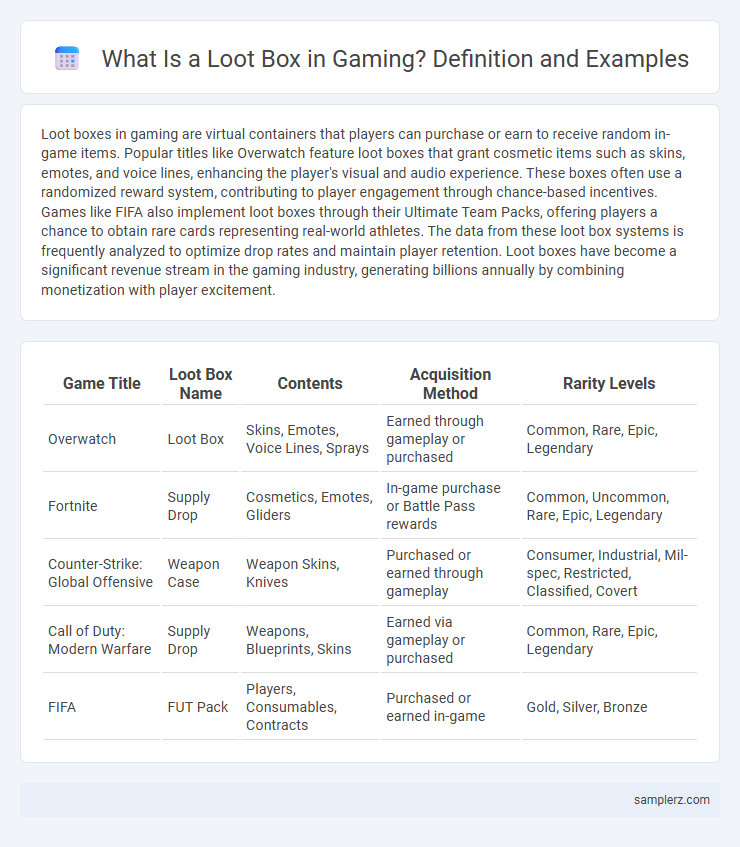Loot boxes in gaming are virtual containers that players can purchase or earn to receive random in-game items. Popular titles like Overwatch feature loot boxes that grant cosmetic items such as skins, emotes, and voice lines, enhancing the player's visual and audio experience. These boxes often use a randomized reward system, contributing to player engagement through chance-based incentives. Games like FIFA also implement loot boxes through their Ultimate Team Packs, offering players a chance to obtain rare cards representing real-world athletes. The data from these loot box systems is frequently analyzed to optimize drop rates and maintain player retention. Loot boxes have become a significant revenue stream in the gaming industry, generating billions annually by combining monetization with player excitement.
Table of Comparison
| Game Title | Loot Box Name | Contents | Acquisition Method | Rarity Levels |
|---|---|---|---|---|
| Overwatch | Loot Box | Skins, Emotes, Voice Lines, Sprays | Earned through gameplay or purchased | Common, Rare, Epic, Legendary |
| Fortnite | Supply Drop | Cosmetics, Emotes, Gliders | In-game purchase or Battle Pass rewards | Common, Uncommon, Rare, Epic, Legendary |
| Counter-Strike: Global Offensive | Weapon Case | Weapon Skins, Knives | Purchased or earned through gameplay | Consumer, Industrial, Mil-spec, Restricted, Classified, Covert |
| Call of Duty: Modern Warfare | Supply Drop | Weapons, Blueprints, Skins | Earned via gameplay or purchased | Common, Rare, Epic, Legendary |
| FIFA | FUT Pack | Players, Consumables, Contracts | Purchased or earned in-game | Gold, Silver, Bronze |
Popular Games Featuring Loot Boxes
Popular games featuring loot boxes include Overwatch, where players can earn cosmetic skins and emotes, and FIFA Ultimate Team, which offers card packs containing player upgrades. Apex Legends utilizes loot boxes for unlocking character skins and weapon customizations, while CS:GO offers cases with rare weapon skins. These games leverage loot boxes to enhance player engagement through randomized rewards and in-game progression.
Iconic Loot Box Mechanics Explained
Iconic loot box mechanics in gaming involve randomized rewards, where players purchase or earn boxes containing cosmetic items, weapons, or power-ups. Titles like Overwatch popularized this system by incorporating visual rarity tiers and increasing excitement through chance-based unboxing animations. These mechanics drive player engagement and monetization by combining unpredictability with exclusive content acquisition.
Notable Loot Box Rewards in Gaming
Notable loot box rewards in gaming include rare character skins, powerful weapons, and exclusive in-game items such as the iconic Loot Crate crates from Overwatch, which offer personalized cosmetic upgrades. Titles like FIFA feature Ultimate Team Packs that grant high-value player cards, enhancing team performance and player collection. In Destiny 2, Eververse Store loot boxes provide unique emotes, shaders, and seasonal armor sets that significantly impact player customization.
Memorable Loot Box Events in History
One of the most memorable loot box events in gaming history occurred in Overwatch's 2016 launch, where millions of players engaged with its elaborate cosmetic loot system, setting industry standards. Another landmark moment was the 2017 Star Wars Battlefront II controversy, which spotlighted the ethical dilemmas and regulatory scrutiny around loot box mechanics. These events significantly shaped player expectations and prompted ongoing discussions about transparency and fairness in gaming monetization.
Loot Box Systems That Changed the Industry
Loot box systems like those in Overwatch revolutionized gaming by introducing random reward mechanics that increased player engagement and monetization. Fortnite's evolving loot boxes combined cosmetic exclusivity and battle pass integration, setting new standards for player retention. EA's FIFA Ultimate Team popularized loot boxes through card packs, significantly impacting sports gaming economies and sparking widespread industry debate.
Controversial Loot Box Examples
Controversial loot box examples in gaming include Overwatch, where players faced criticism for promoting gambling-like mechanics through randomized rewards. FIFA Ultimate Team also drew scrutiny for its high-stakes microtransactions, with players purchasing packs for rare player cards. These cases highlight ongoing debates about ethical game design and regulatory oversight in the gaming industry.
Free vs. Paid Loot Boxes: Key Differences
Free loot boxes in gaming often provide basic rewards or common items that enhance gameplay without additional costs, promoting player engagement and satisfaction. Paid loot boxes usually offer rare or exclusive items, skins, or power-ups, giving players a competitive edge or cosmetic upgrades through direct monetary investment. The core difference lies in accessibility and content value, where free loot boxes serve as incentives and paid versions function as monetization tools from game developers.
Seasonal Loot Boxes: Unique In-Game Examples
Seasonal loot boxes in gaming offer exclusive items tied to specific events, such as Blizzard's Overwatch Winter Wonderland crates featuring limited-time skins and emotes. Epic Games' Fortnite introduces holiday-themed loot boxes during events like Christmas, providing players with unique character outfits and emotes unavailable outside the season. These seasonal loot boxes enhance player engagement by delivering time-sensitive rewards that celebrate in-game festivals and holidays.
Cosmetic Loot Box Drops: Fan Favorites
Cosmetic loot box drops have become a staple in popular games like Overwatch, Fortnite, and Apex Legends, offering player-favorite skins, emotes, and weapon wraps. These fan-favorite cosmetic items enhance player personalization without impacting gameplay balance, driving player engagement and monetization. The excitement of rare skin drops and exclusive emotes in these loot boxes fuels ongoing community enthusiasm and in-game participation.
Rare Loot Box Items That Made Headlines
Rare loot box items that made headlines include Fortnite's exclusive Midas Touch skin, which gained massive attention for its limited availability and golden design. Overwatch's Golden Weapon skins also created buzz among players due to their rarity and prestige in gameplay customization. The surprise of acquiring these high-value items fueled player excitement and discussions in the gaming community worldwide.

example of loot box in gaming Infographic
 samplerz.com
samplerz.com